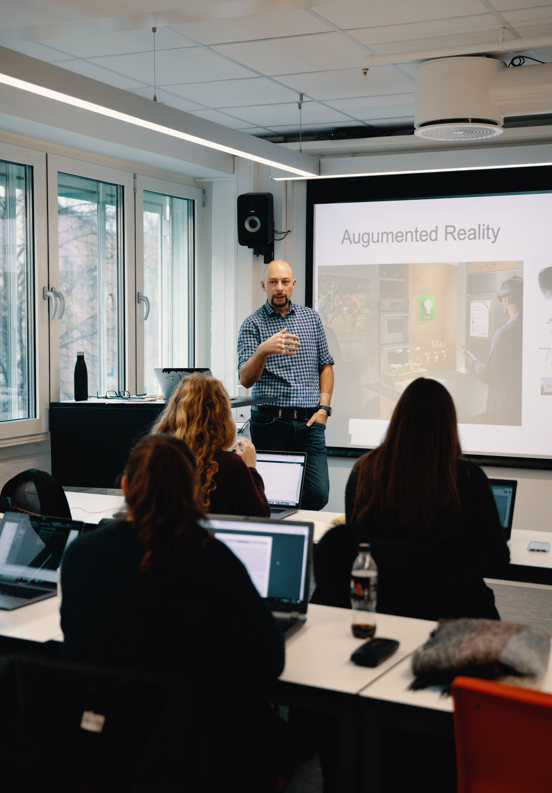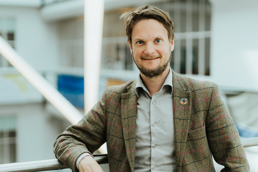
Human-Computer Interaction, (part-time)
Vil du være med å utvikle fremtidens IT-systemer? Dette er deltidsverjsonen av en mastergrad som gir deg avansert kunnskap om utvikling og design av brukergrensesnitt, som skal komme forbrukere, selskaper og samfunn til gode.
Nøkkelinformasjon
Praktisk tilnærming til faget
De fleste emnene er bygget rundt praktiske oppgaver.Tverrfaglighet
Studiet ligger i skjæringspunktet mellom teknologi og design.Undervisere med bransjeerfaring
Du lærer av dem som kjenner bransjen.Viktige frister
Søknadsfristen er 15. april. Dokumentasjonsfrist for vitnemål og attester er 15. juli.Opptakskrav
Les mer nederst på siden.Pris
36 100 kr pr semester. Kvalifiserer til støtte fra Lånekassen.
- Master
- Høst 2022
- Deltid
- 120 studiepoeng
- Oslo
- 3 år
- Engelsk
Hva lærer du?
For å utvikle gode brukeropplevelser er det viktig å forstå både teknologien og menneskene som bruker den, samt hvordan samspillet mellom menneske og teknologi fungerer best mulig. I løpet av studietiden din hos oss får du derfor en grundig innføring i:
De fleste emnene er bygget rundt praktiske oppgaver, hvor man får leke med teknologi og design. Det er også stor variasjon fra fag til fag.
Studiemodell
- MH120Interaction Design Studio
This module focuses on advanced topics in interaction design, exploring the various interfaces through which humans interact, and the characteristics of how human interaction is perceived as intuitive. The course will explore the sequential character of user experience based on the fields of Service Design and Design Thinking. The student will gain knowledge in the process from gathering user requirements, to design and implementation through lab-oriented development-methods.
- MH130UI Programming and Architectures
This course aims for the students to gain a foundation in how to program user interfaces and understanding of the underlying system architecture. Candidates will acquire advanced understanding in interaction techniques, design cycles and prototyping. Further knowledge of the terminology used by programmers aim to bridge the gap to developers. In practical skills the candidates will be required to design, implement and test/evaluate prototypes, through their developed user interfaces, chosen input/output techniques and executable programs. After successful completion of the course it is expected critical reflection on contemporary themes within user interfaces and the ability to critically discuss suitable UI approached to align with underlying system architecture.
- MH220Research Design and Methodology
Research is a cyclical process where new and carefully planned investigations build and extend on established work. The aim is to provide students with a fundamental understanding of research as a conceptual, empirical and practical approach to gathering new insight and knowledge within HCI. Teaching centres on applied research from the field of HCI and presents students with relevant methods from this domain, along with their possibilities and limitations.
Emphasising the importance of background work with a solid understanding of past research, an important outcome of this course is a structured literature review that forms the foundation for a project plan. Furthermore, students will learn a systematic approach to empirical investigation, including research design and methodology, qualitative and quantitative analyses, and the presentation and evaluation of results.
At completion of the course, students will be prepared to begin work on their own research project.
- MS210Agile Project Management
Agile project management is an iterative approach to delivering a project throughout its life cycle. Organizations need to develop project and product managers who can complete projects on time and within budget, and this course addresses challenges such as the ability to manage projects and stakeholders, technical debt, risk assessment and agile planning. Students will gain advanced knowledge of the key theories of project management and agile development.
- MS402Master's Thesis
The aim of this course is to provide the student with an opportunity to develop systematic understanding and critical awareness on the solution of a relevant problem in the student's focus area. Students will gain advanced knowledge of the research process at Master level, including a deep knowledge of selected theories. They will acquire specialized problem-solving skills, be able to plan and conduct the steps in the research or development process at a high standard. They shall take responsibility to conduct a well planned and executed project at Master level.
- CRC5100Culture, Religion and Communication
In a globalized era, effective intercultural communication is vital for leaders and professionals in diverse fields. This course offers an in-depth exploration of intercultural communication, blending theory, practical exercises, and reflective learning to hone skills for bridging cultural differences.
Focusing on the role of culture, the course provides insight into the dynamics of communication shaped by religious contexts. Students engage in scholarly inquiry and experiential learning to understand and navigate the complex interplay between culture, religion, and communication—skills crucial for addressing conflicts and fostering global societal understanding.
This course address culture and politics in Europe and the United States, with emphasis on how the dominant culture impact social practices, and how cultural differences among individuals may influence communication. Participants will emerge equipped to mediate cultural complexities professionally and ethically.
- ICR5100Marketing Analytics
In today's data-driven world, marketers must harness the potential of their data to make informed decisions and achieve business success. This course provides students with the necessary knowledge and skills to explore, analyze and derive valuable insights from market data.
From a basic introduction to data pre-processing and exploratory data analysis, students will delve into market segmentation, predictive analysis, classification, association rules and sentiment analysis. They will also learn how to measure customer lifetime value, predict customer churn, and perform survival analysis.
Through a combination of theory and practical exercises, students will gain practical experience with the use of industry standard tools. They will complete a final project in which they present their insights and solutions to real marketing challenges.
At the end of the course, students will be well equipped to apply data mining methods in various marketing scenarios and drive data-driven decision-making in future careers. Join us to become a data-savvy marketer and lead the way in the ever-evolving landscape of market analytics.
- KUN5201Kunnskapsledelse
Emnet skal ta for seg sentrale teorier og problemstillinger innenfor kunnskapsledelse og organisasjonslæring. Sentralt er ledelse for utvikling av en sterk læringskultur som ivaretar kunnskapsutvikling, endring og innovasjoner i organisasjoner. Emnet inkluderer derfor temaer som ledelse for kompetanse og kompetent ledelse, kompetanse som taus og eksplisitt, kompetansemobilisering, mellomledelse, strategisk og dynamisk kompetanseledelse, HR, organisering og digitalisering. Emnets mål er å gi studentene inngående kunnskap i relevant teori for faget, og praksis, som beskriver hvordan bedrifter kan jobbe for å optimalisere egen organisering og drift, ved hjelp av kunnskapsledelse.
- POK5100Politisk kommunikasjon
Politisk kommunikasjon handler om hvordan kommunikasjon påvirker styringen av samfunnet, konflikthåndering, offentligheten og verdier. Politisk kommunikasjon dreier seg om hvordan informasjon sprer seg og påvirker politikere, medier og borgere- i analoge og digitale kanaler, online og offline. Digitale kommunikasjonsteknologier setter nye premisser - både muligheter og begrensninger - for hvordan politisk kommunikasjon kan foregå.
Dette emnet vil ta for seg kjernebegreper innen politisk kommunikasjon, de sentrale aktørene innenfor politisk kommunikasjon, hvordan de ulike politiske aktørene kjemper for sine interesser, kampen om dagsorden, nyhetsmedienes rolle i offentligheten, nye kommunikasjonsteknologier, samt velgernes deltakelse i og utøvelse av politisk kommunikasjon.
- PSO5100Power and Status in Organizations
Formal and informal social hierarchies, represented by power and status, are ubiquitous and represent fundaments of human organization. Moreover, although not the sole cause of influence, power, and status are important antecedents of influence in organizations. The primary focus of this course is for the students to get an advanced understanding and critical reflections of the psychological perspective on power, status, and influence. Why do some people attain power and status? How and why are people changed by the experience of power and status? What are important intrapersonal and interpersonal moderators of the effect of power and status? These are examples of questions that will be raised, and it is expected that students, after finishing the course, will be able to analyze, critically discuss, and apply the psychological perspective on power and status to real-life organizational challenges.
- LSK5100Ledelse av sensoriske kundeopplevelser
Ledelse av sensorisk opplevelser handler om teori og metoder som organisasjoner kan bruke for å påvirke kundeopplevelser og kjøpsatferd. Gjennom bruk av metoder som påvirker kundene bevisst og ubevisst blir sensorisk markedsføring en viktig kilde til konkurransefortrinn og differensiering.
Formålet med dette kurset er å gi masterstudenter kunnskap om og forståelse for nøkkelbegreper innen sensorisk markedsføring gjennom arbeid med en blanding av underliggende teoretiske prinsipper samt praktiske implikasjoner der studentene møter og diskuterer både nyeste forskning og gjeldende forretningspraksis.
Kurset inkluderer temaer som:
- Sensorisk markedsføring og kundeopplevelser; deres betydning for næringslivet og forbrukere i samfunnet
- Individualisering som livsstil og merkevarens betydning, både fra et forretnings- og forbrukerperspektiv
- Sanseuttrykk, følelser og sanseopplevelser knyttet til den menneskelige hjerne og persepsjon
- Opplevelseskonseptet som uttrykk for menneskets sanser, karakter og den ultimate sanseopplevelsen
- TDM5100Tactical Digital Marketing
The digital world is a great opportunity for companies to promote their brands, through the various tactics (e.g., influencer marketing, search engine marketing, social media marketing, email marketing, etc.) available to them. This course’s main objective is that students develop a reflected understanding of the use of digital marketing tactics to reach out to, convert, and interact with customers or other relevant stakeholders. The course will provide students with the knowledge and skills necessary to make informed decisions regarding digital marketing tactics.
- DSP5200Data Analytics with Generative AI and Large Language Models
This advanced course on Data Science Applications delves into the fascinating world of Generative AI (GenAI) and Large Language Models (LLMs), exploring the cutting-edge technologies and methodologies that drive innovation in AI-generated content. Students will gain a deep understanding of the principles and a high-level understanding of algorithms underlying generative models, such as neural networks, deep learning, and reinforcement learning. The course also emphasizes practical applications across various fields, such as healthcare, business, marketing, advertising, and education, offering a comprehensive view of how Generative AI can transform these domains in the coming years. The course also includes some hands-on exercises using Python programming language.
- DTH5100Design Thinking in Practice
Design Thinking is a human centric approach to business that emphasises empathy, creative thinking, and experimentation. Of course, Design Thinking, cannot happen in a vacuum. Organizations that practice Design Thinking must ensure that the problems that are identified and the ideas that are developed through the process are relevant and implementable. This course will provide you with the necessary vocabulary, knowledge, and skills to understand the implication of Design Thinking as a mindset, method and set of tools that can be of use to manage and implement innovation.
The course will combine theory and practice and will feature cases from start-ups, businesses, and public sector organisations. The cases will enable the student to understand the challenges of applying Design Thinking for innovation in various contexts and the means to overcome barriers.
The students will undertake a project throughout the course that will involve working together on a real innovation challenge to learn the tools and methods. Pausing and reflecting on the learnings will ensure a holistic learning experience.
Content
Innovation is a must especially in times of crises. The crises triggered by the pandemic have demonstrated how innovation is not only a matter for the private sector, but also mandatory in the public sector. Meanwhile the main challenge faced by most organizations remains: finding a way of managing innovation as a process that can be orchestrated within their daily core activities and allows for creativity and novelty to flourish. Design Thinking can be applied as an innovation enabler to (re)design tangible products, intangible services or processes, as well as the complex systems of learning and working within a company. The popular Design Thinking innovation process pioneered by companies such as IDEO; SAP and the D School at Stanford helps organizations apply principles, methods and tools inherent to the design discipline, to manage innovation.
The question is how to best manage resources and efforts within the different types and levels of innovation and adjust the organizational support structures and roles.
The course will cover how to use immersive research methods to build empathy, how to define problems, how to create and test solutions that align with an innovation strategy and how to implement ideas and overcome barriers to change.
- IRI5100Incident Response and Investigations
- MA211Mobile Computing and Internet of Things
Students will gain in-depth knowledge of mobile computing and introduce the Internet of Things (IoT). Students will further acquire knowledge of theories/models of mobile and pervasive computing applications, technologies and common research paradigms in mobile and pervasive computing such as context awareness, computing in an environment with limited resources, sensor-based interaction, and smart-device management. They will acquire skills in application design, architecture and implementation. Students will be expected to be able to analyse, discuss and critically reflect upon theories and research issues in mobile computing and internet of things.
- MB110Data Management
Data Management is an essential and critical process with organizations. This course will provide students with an introduction to data management techniques, data warehousing and business intelligence. Students will gain advanced knowledge of key theories and concepts of data management processes, data collection, sharing and storage, data documentation, data compliance, data preservation, and an overview of the open data requirements. They will acquire specialized problem-solving skills, being able to analyze and prepare data management plans.
- MB121Applied Behavioral Economics
Theories of choice-making have long been an important foundation for information systems research. Using psychological experimentation, the discipline of behavioral economics provides the dominant contemporary approach for studying the effects of cognitive, emotional, social and cultural factors on human choice-making. Therefore, it is reasonable that information systems research that involves choice-making should consider behavioral economics as a foundation or reference theory. The goal of this course will be to deploy relevant behavioral economic theories in information systems to explain and predict human choice-making.
- MB210Text Mining
The aim of the course is to introduce the students to the concepts and techniques of natural languages processing and analysis, unstructured information analysis and management for better decision-making by deriving valuable insights from enterprise content regardless of source or format. The course provides deep and rich knowledge of text analysis techniques and applications including natural language processing basics, text processing and representation, text classification, clustering and similarity analysis, and other techniques and applications using real-world data and cases.
- MB221Advanced Visual Analytics
Data and visual analytics are an evolving field concerned with analyzing, modeling, and visualizing complex high-dimensional data. This course will introduce students to the data visualization domain by covering state-of-the-art modeling, analysis and advanced visualization techniques. It will emphasize practical challenges involving complex real-world data and include real-world case studies and hands-on work with several leading visual analytics tools and programming languages. Students will gain advanced knowledge of the art of decision-making, as well as acquire specialized problem-solving skills and deliver value to organizations through the development of advanced visualizations.
- MD112Digital Consumer Behavior and Consumer Neuroscience
The link between understanding customers and developing strategies has become more complicated in the current multi-media web-oriented environment. Customers can evaluate brands and choose alternatives from a myriad of sources. Customers have also become more empowered to determine the nature of the ads and information they see and the characteristics of the brands they buy. The aim of this course is to follow two streams of thought: First, every organization’s fundamental strategy and orientation should lead to satisfied customers and create value considering ethical issues and meeting sustainability goals. Second, understanding customers’ needs is the foundation for all steps in the value creation chain, starting with developing a product, advertising, pricing, and distribution strategies. The premise is that an understanding of the digital consumer is imperative for those pursuing careers in digital marketing.
- MD113Digital Marketing
This course provides the forefront of knowledge using digital media, e-commerce, and social media to create optimal customer experiences and facilitate marketing. Students will gain advanced knowledge of key theories and concepts of Digital Marketing. They will acquire specialized problem-solving skills, being able to plan Digital Marketing activities, and to configure Digital Marketing solutions. They shall take responsibility to conduct the planning and implementation of Digital Marketing activities and evaluate the business value.
- MD210Internet of Things in Business
The aim of the course is to introduce the Internet of Things (IoT) in relation to Digital Business Systems and organisations. The overarching objective of IoT in business is to broaden the student’s perspective on future and contemporary IT phenomena and state- of-the-art technologies. Emphasis is invested in relating the contemporary IoT theme to general and selected contexts and industries like IoT in healthcare, Industry (4.0), Supply Chians and Logistics, etc.
The course also introduces the various technologies used in the IoT domain, and emphasizes on their real-world use and applications. The students will also be introduced to developing business cases within the IoT domain.
- MI111Innovation – Concepts and Perspectives
The course aims at providing insight into theoretical and practical aspects of innovation. Students will gain advanced knowledge of key concepts and theories of IT-supported innovation. They will acquire specialised problem-solving skills, being able to analyse innovation cases using different models. They shall take responsibility to conduct a review of the current state-of-the-art in innovation theory.
Central topics includes innovation theories and concepts, digital innovation, service innovation and innovation in organizations.
- MI221IS Infrastructures and Platforms
The module introduces the students to large-scale information systems and these are designed, deployed and how such systems evolve in organizations and markets. The students are introduced to the IS literature on information infrastructures and multisided digital platforms and ecosystems. Especially, the module covers theories of path constitution, generativity, and installed-base cultivation in order to understand and explain the dynamics of information infrastructures and digital platforms. Based on these theoretical insights, the students gain competencies for designing and governing infrastructures and platforms.
- MS130Customer Journey and CRM
Customers are omnichannel-oriented. They increasingly expect to interact with organizations in a seamless way, combining aspects across different channels at different stages of their decision journey. This course provides the forefront of knowledge on how to support the omnichannel customer experience, what the customer expect, how organizations can use Customer Relationship Management (CRM) to leverage their presence, and what organizations need to support an omnichannel strategy.
Students will gain advanced knowledge of key theories and concepts of omnichannel and CRM. Omnichannel is the seamless and effortless consolidation of the various channels, to enhance the overall customer experience. They will acquire specialized problem-solving skills, being able to plan omnichannel activities, and to configure CRM solutions. They shall take responsibility to conduct the planning and implementation of CRM activities and evaluate the business value taking into account meeting ethical and sustainability goals.
- MS310Consulting and Leadership
This course focuses on the soft skills in management of information systems. Students will gain advanced knowledge of theories on leadership, change agents, ethics and required skills within IT-consultancy. They will acquire specialized problem-solving skills, being able to master the personal and organizational techniques required to participate in a change process, practicing leadership and developing professional skills within consulting. They shall take responsibility to conduct a minor consulting project thru an agreement, plan and evaluation.
Central topics include consulting and leadership.
- SOB5100Sustainability and Innovation
Business organisations have a clear responsibility for many of the current social and environmental problems. However, they are also in a unique position to solve many of these problems by using sustainability as a basis for innovation brand building and marketing. The purpose of this course is to look at how organizations can build brands innovatively and market them in an effective and ethical way. The course will look at how sustainable thinking creates opportunities, when organizations make sustainability core to their purpose and actions. This approach goes beyond traditional Corporate Social Responsibility (CSR) approaches, which often make sustainability an added extra, to argue that sustainability should be core to an organization’s operations. The course will encompass the roles different stakeholders play in influencing businesses to act conscientiously, the challenge of trade-offs in sustainable innovation and the issues related to effective communication.
- MAD5101Bygda
Emnet bygger rundt et tverrfaglig prosjekt med hovedfokus på å skape en positiv effekt i et lokalsamfunn, en bygd. Praktisk arbeid er sentralt i emnet, samt evnen til å gjennomføre et prosjekt fra konsept til gjennomføring.
I løpet av kurset skal studenten ved å bruke kompetanse innenfor sitt eget fagfelt, produsere noe som gir verdi for bygda. Dette kan for eksempel være et sted for sosialt samvær, en tjeneste for lokalsamfunnet eller et kulturarrangement.
Denne modulen har tre faser, først identifisering av behov og muligheter, deretter gjennomføre en analyse og til slutt å produsere en praktisk løsning. Gjennom hele modulen brukes samskaping som en metodisk tilnærming.
- MAD5104Spill og scenarioer
I dette emnet undersøkes rollen til spilldesign for å forstå aktuelle samfunnsfloker/wicked problems. Studentene jobber sammen med oppdragsgivere fra ulike bransjer for å skape, og eksperimentere med, ulike typer spill og spillmekanismer. Emnet er basert på forskjellige praksiser og metoder innenfor sjangerene spilldesign, gamification, tjenestedesign, scenarioutvikling og systemdesign, men studenter trenger ingen forkunnskaper.
I emnet brukes spilldesign for å forstå nyanser og ulike sider i en samfunnsrettet problemstilling. Ved å designe og spille ut forskjellige scenarioer får studentene muligheten til å utforske hele eller deler av problemet fra nye perspektiver. Spillene baseres på grundig research og spilltesting mot relevant(e) publikum. Studentene skal etter fullført emne kunne bruke spilldesign som metode, f.eks. i arbeid med masteroppgaven eller i arbeidslivet.
Emnet er en del av et forskningssamarbeid med Georgetown University, og ved anledning vil studentene samarbeide med forskere og masterstudenter i USA.
Hva kan du bli?
Du kan blant annet jobbe som:
- UX specialist
- Human-Computer specialist
- Interaction designer
- Web, software or system developer
- Experience designer
Flere av våre tidligere studenter i dette kurset har fått relevante jobber i selskaper som SAP, Xledger, SAS og Microsoft.

Maren vil gjøre hverdagen din på nett enklere
Møt fagmiljøet

Slik jobber vi
Vår forskning vektlegger økonomi, innovasjon, digitalisering og IT. I tillegg er det flere spennende forskningsprosjekter innen anvendt informatikk, informasjonssystemer og interaksjon mellom teknologi og mennesker. Våre forelesere har lang erfaring fra både bransje og akademia, og vi benytter relevante gjeste- og timeforelesere som tar med sin arbeidshverdag inn i undervisningen. Dette gjør at du som student blir vant til å løse de samme utfordringene som venter på deg når du er klar for arbeidslivet.Slik er studiehverdagen
Kristiania er et sted hvor alle passer inn, men hvor du likevel studerer sammen med andre som brenner for det samme som deg. En utdanning fra Kristiania er praktisk orientert, og du vil ofte jobbe med reelle oppdragsgivere. Det gjør at våre studenter er ettertraktede på arbeidsmarkedet, også før de er ferdig utdannet. Studentforeninger gir mulighet for å knytte tette bånd rundt felles interesser, mens inkubatorer som Loftet og Bryggeriet skaper et yrende og inspirerende miljø for studenters egne bedrifter.
Slik er søknadsprosessen
Viktige frister
Søknadsfristen er 15. april. Dokumentasjonsfrist for vitnemål og attester er 15. juli.Viktige fristerBehandlingstid
For studier med rullerende opptak mottar du et betinget studietilbud i løpet av 1-3 dager etter søknad, dersom det er ledige plasser på programmet du har søkt.Les merSlik søker du
På Mitt Kristiania, aksepterer du tilbudet og laster opp nødvendig dokumentasjon på dine kvalifikasjoner.Les mer
Semesterregistring
Du må registrere deg for semesteret i StudentWeb. Dette er et krav for å få utbetaling fra Lånekassen.Les merSiO (Oslo) og Sammen (Bergen)
SiO og Sammen tilbyr boliger, helsetjenester, barnehage, treningssenter og mye mer til sine medlemmer.Les merLånekassen
Alle våre studier er offentlig godkjent og gir rett til å søke lån og stipend fra Lånekassen.Les mer
Støtte og tilrettelegging
Som student kan du få rådgivning, tilrettelegging og oppfølging på studierelaterte spørsmål og utfordringer. Vi har taushetsplikt.Les merMitt Kristiania
Her finner du timeplan, pensum, tjenester og alle andre verktøy du trenger som student.Les merStudentbevis
Studentbevis er ditt adgangskort til campus, betalingskort på printere og lånekort på vårt bibliotek. Dette får du i våre resepsjoner (unntatt i Brenneriveien).Les mer
Hva lurer du på?

Ofte stilte spørsmål
Les mer om våre studenter
 IT-bransjen trenger folk - også deg som ikke liker matteVi omgir oss med teknologi fra morgen til kveld. Teknologien er kommet for å bli, og behovet for ulike typer mennesker med ulik IT-kompetanse øker.
IT-bransjen trenger folk - også deg som ikke liker matteVi omgir oss med teknologi fra morgen til kveld. Teknologien er kommet for å bli, og behovet for ulike typer mennesker med ulik IT-kompetanse øker.
